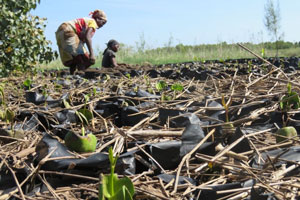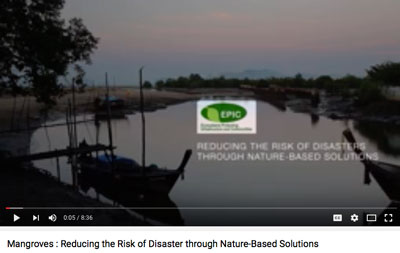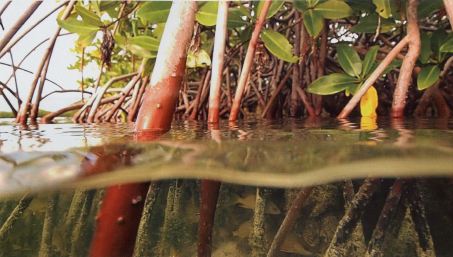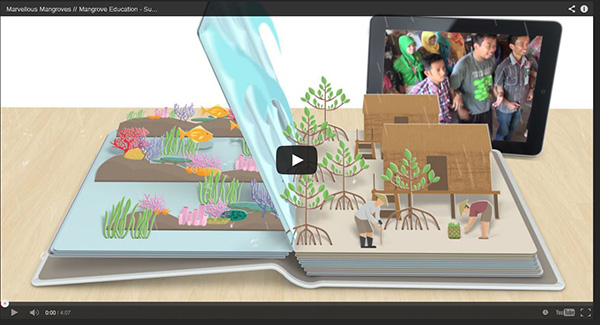FEATURE STORY Mangroves: the secret weapon in the carbon battle  USA – We may have had the solution to carbon sequestration under our noses all along – but have we recognised it too late? Mangrove forests cover only a small percentage of the planet in comparison to other forest types – roughly 1.9% of coastline in the world – but they contain the largest source of carbon sequestration per hectare of land and are a major player in the carbon cycle of the oceans. This means they have high economic value as “blue carbon” – carbon captured in oceans and coastal ecosystems – but around the world they have often been destroyed in the course of coastal development, agricultural and mining activities. Increasingly, however, they are being acknowledged as formidable carbon sinks. But has this acknowledgement come too late? Does the ongoing loss mean we’ve squandered our best last chance to put the brake on global warming? Carbon is stored as biomass in the sediment captured through the growth of mangroves. The carbon produced by its decomposing roots alone is a major contributor to this complex sink. The removal of mangroves adds 10% to the total carbon lost from global tropical deforestation through greenhouse gas emissions. READ MORE AFRICA Mangrove Conservation for Improved Climate Resilience in the Limpopo River Basin

MOZAMBIQUE – Mangrove ecosystems are under threat globally, disappearing at an annual rate of 1%. At this rate, mangroves could be extinct within the next 100 years. In the Limpopo River Estuary, where the only mangroves in the basin are found, the livelihoods of many rural people depend on the ecosystem goods and services mangroves provide. With climate change expecting to increase the frequency and intensity of extreme weather events, the rehabilitation and conservation of mangrove vegetation is more needed than ever. The USAID Southern Africa Resilience in the Limpopo River Basin (RESILIM) program partnered with the Centre for the Sustainable Use of Coastal Zones in Mozambique to work with the local communities in Xai-Xai, to replant and rehabilitate mangrove vegetation in the river estuary and raise awareness about the importance and the need for mangrove ecosystem conservation. This video explains the methodology used and shows how it is done for replication anywhere in the world. VIEW VIDEO Red Sea mangroves fight back in the face of global decline

Our research shows that there has been no decline in mangrove stands in the Red Sea – the body of water that runs between Africa and the Arabian peninsula. Red Sea mangrove coverage has actually increased by 12% since 1972. We used remote sensing to analyse satellite images and map the temporal and spatial prevalence of mangroves around the coasts of the Red Sea over the past four decades. The Red Sea is one of the world’s saltiest and warmest seas. It is an extremely harsh environment, surrounded by desert and subject to very high temperatures. No rivers empty into the sea, which, along with the warm conditions, give it its high salt content. The mangroves found along the Red Sea coasts are some of the northernmost in the world. The extreme conditions mean that the mangroves of the Red Sea have been subjected to much lower levels of human activity than elsewhere. READ MORE ASIA Global Mangrove Alliance rallies the world to reverse loss of world’s most valuable coastal ecosystems
INDONESIA – At the World Ocean Summit in Bali, Indonesia The Global Mangrove Alliance announced an initiative to increase mangrove habitats 20 percent by 2030. Conservation International, The Nature Conservancy and World Wildlife Fund will work together to build a global alliance and leverage the expertise, funding, knowledge, resources, diverse skills and networks of all members to amplify existing efforts and increase attention to the critical role of mangroves in coastal ecosystems. The Alliance is developing a work plan based on consultations with experts on the ground around the world. Projects will be expanded locally, regionally and globally with communities, governments and private sector leaders committed to halting and reversing mangrove forest loss, which already amounts to 50 percent of the world’s habitats over the past half century. “People who live in and around mangroves benefit from their services but it’s important that people around the world realize the impact that mangrove habitats have on our planet,” said Maria Damanaki, Global Managing Director, Oceans at The Nature Conservancy. “The loss of these ecosystems could cause devastating effects to wildlife and humans alike and we need to start taking greater action now.” READ MORE AMERICAS Young mangrove defenders fight to save Panama's wetlands

PANAMA – Panama's mangroves play a key role in fighting global warming. They absorb and store billions of tons of CO2 and protect against coastal erosion and storm surges. But they are under threat. Since the 1970s, Panama has lost 55 percent of its mangrove forests. Thousands of hectares have been cut down to make way for apartment blocks and grazing pastures. And so-called "cascareros" – people who specialize in debarking red mangroves for the tanning industry – have also destroyed millions of trees. But, with international help, Panama is turning the tide. Its environment ministry is designing new conservation rules and working with local inhabitants to preserve the mangroves. One part of the project involves a group of school children who call themselves young mangrove defenders. VIEW VIDEO Reports of Mangrove Damage in Yucatan
MEXICO – There are more than 300 closures and 100 complaints to the Attorney General's Office (PGR) in Yucatan for the invasion and destruction of mangroves in the jungle of Progreso. The problem is that that authority does not give them due course, said Jose Lafontaine Hamui, delegate of Profepa in the complaint. The problem of swamp invasion by families that destroy the mangroves to fill the site with make-shift cardboard and wood houses is serious, he said. The official warned that in addition, they must understand that they are installed in a high-risk area, as they not only affect and invade a federal area, but also put themselves in danger with their fragile homes. He also noted that agencies have worked to prevent the action and have done everything in their power, but the other instances to which they have to act they do not. The invaders violate the law, commit federal crimes, even more are destroying the mangroves. All that is missing is that the Attorney General's Office take action and do his part, he said. LEA MAS EN ESPANOL EQUATOR PRIZE 2017 CALL FOR NOMINATIONS

The Equator Prize 2017 will be awarded to outstanding community and indigenous initiatives that are advancing nature-based solutions for local sustainable development. Each winning group will receive USD 10,000 and will be invited to participate in a series of policy dialogues and special events during the United Nations General Assembly in New York in September 2017. In celebration of its 15th anniversary, the Equator Initiative will also launch a web portal of local nature-based solutions to sustainable development. The platform will serve to connect communities around the world and share local solutions that work. Participation in this platform is optional when submitting nominations for the Equator Prize. Nominations may be submitted in Arabic, Chinese, English, French, Indonesian, Portuguese, Russian, or Spanish. Nominations must be submitted by 8 March 2017.
For full eligibility requirements and selection criteria, please click here.
To access the online nomination system, please visit prize.equatorinitiative.org EUROPE Mass mangrove restoration: Driven by good intentions but offering limited results

SWITZERLAND – In recent years, hundreds and sometimes thousands of volunteers have been involved in mass mangrove planting efforts, gaining media recognition and even earning entries into the Guinness Book of World Records. This has drawn attention to the urgent need to address the global degradation of coastal ecosystems. But are these planting initiatives sustainable? Do they have the desired impact? In short, do they work? Coastal communities are first to face the impacts of coastal degradation – reduced flood protection, decreased water quality, extreme soil erosion and a rapid decline in the variety and abundance of food sources (many of which come from mangroves in the tropics). Mass mangrove plantings should help address these challenges in certain areas, but instead many restoration efforts worldwide (for example, in the Philippines) are failing. There are several issues. Restoring a mangrove is a complex process that needs to be founded on the principles of ecosystem management. Often, fast-paced and large-scale ‘restoration events’ are not necessarily scientifically robust in terms of which mangrove species should be restored, and where. READ MORE OCEANA Scientists to test 50 coral reefs to seek ways to counter climate change

AUSTRALIA – Ocean scientists will pick 50 coral reefs worldwide to test ways to limit damage from climate change, pollution and over-fishing that threatens to wipe out 90 percent of all reefs by 2050, according to a plan launched on Thursday. Last year was the warmest on record the third time in a row, damaging corals from Australia's Great Barrier Reef to the Caribbean, a loss for fragile species and a threat to coastal economies in the magnitude of billions of dollars. An alliance of scientists, conservationists and philanthropists said experts will select 50 reefs around the globe during 2017 and then test conservation techniques that will be extended elsewhere if successful. "There's been a lot of work on identifying the train crash (for corals) but very little about 'let's not let this happen'," said Ove Hoegh-Guldberg, director of the Global Change Institute at the University of Queensland and a leader of the "50 Reefs" project. READ MORE Mr. José Antonio Galdames
Secretary of Energy, Environment and Natural Resources Mines. (My Environment)
joseantoniogaldames@gmail.com Ing. Misael León
Executive Director
Forest Conservation Institute Protected Areas and Wildlife. (ICF)
icfdireccion@gmail.com cc: Juan Orlando Hernández Alvarado
President of the Republic of Honduras Dear Sirs, I believe that you are the correct officials responsible for the conservation of your nation’s mangrove ecosystems, which are facing some very real threats from development. I am the co-founder and director of Mangrove Action Project (MAP), which is a global network seeking to conserve and restore mangrove wetlands worldwide. We at MAP are quite concerned that even today illicit development of new shrimp farms is causing wide-scale losses of even “protected” mangrove forests in Honduras. Such further loss to the mangroves anywhere is of worldwide concern to all of our network, namely because mangroves play such an important role in combating climate change, supporting will fisheries, protecting coastal communities from natural disasters such as hurricanes and tsunamis, and preventing coastal erosion from sea level rise. We all need the mangroves, and for these reasons and more, we need to enforce the laws and punish the perpetrators who are illegally clearing mangroves for private gains. Mere payment of a small fine by those who have destroyed such protected areas will never be enough. We at MAP urge you to halt further such losses and help us work to restore the mangroves that have been affected by shrimp farm expansion or roadway building. This is especially relevant in the case of the Protected Areas of the Gulf of Fonseca and Ramsar Site # 1000. For the Mangroves and the Mangrove Communities! Alfredo Quarto,
Co-Director
Mangrove Action Project
alfredo@mangroveactionproject.org
We'd love to hear from you! Write us your stories or respond to ours and we'll select one to feature here, giving you "The Last Word"!  BACK TO TOP
Not yet a subscriber? Click here to subscribe. Please cut and paste these news alerts/ action alerts on to your own lists and contacts. Help us spread the word and further generate letters of concern, as this can make a big difference in helping to halt a wrongdoing or encourage correct action. ACTION ALERTS WANTED: MAP News is looking for links to calls to actions/petitions and letter writing campaigns on mangrove issues, tropical coastal communities and other related topics. Not all submissions can be selected, but we look forward to hearing about your work and want to let our readers' voice be heard!
Email submissions to news@mangroveactionproject.org | Action Alerts:EQUATOR PRIZE 2017 CALL FOR NOMINATIONS
Nominations must be submitted by 8 March 2017. For full eligibility requirements and selection criteria, please click here. Save the mangrove forest in Pitas (Sabah), Eastern Malaysia
Please support this important alert being launched by forest peoples programme (FPP) SIGN PETITION
VIEW VIDEO The world's largest mangrove forest is in danger from a massive coal plant.
UNESCO can put pressure on India and Bangladesh to protect the forest, but they need to see that people around the world are speaking out. Click here to add your voice 
This is our 16th annual edition of Children's Mangrove Art, and this Calendar is celebrating MAP's 25th Anniversary! Please order your calendars now, and help us celebrate a quarter century of MAP's work to Save the Mangroves!" Mangroves: Guidebook to Malaysia – available for download here
Mangrove rehabilitation in Asia – Local Action and cross-border Transfer of Knowledge for the Conservation of Climate, Forests and Biodiversity VIEW VIDEOS HERE
STOP PLANTING MANGROVES ON SEAGRASS BEDS _ A CALL TO ACTION What is CBEMR? Easy to follow fact sheet – CLICK HERE SHARE MAP'S VISION
CLICK HERE to watch short introductory video. Together we can work "at the roots of the sea". Our short documentary, Reducing the Risk of Disaster through Nature-Based Solutions : Mangroves
Exclusive Interview with Alfredo Quarto, Co-Founder and Executive Director of Mangrove Action Project – See more
Question Your Shrimp- Don't Buy or Sell Imported Tropical Shrimp! Sign the Petition
Marvellous Mangroves Curriculum

MAP Education Director Martin Keeley’s most recent book is Marvellous Mangroves: Myths and Legends, a compilation of stories from “Mangrove Peoples”—those who live on shorelines where mangroves thrive—from around the world. READ MORE
Marvellous Mangroves Curriculum in Bangladesh – WATCH VIDEO MARVELLOUS MANGROVES IN BRAZIL
En PortugesVISIT OUR "MM" WEBPAGE Check out our presentation for more details on Marvellous Mangroves “Education In The Mangroves" can now be seen on the PhotoPhilanthropy website here! Read this 10 page history of the development of MAP’s educational curriculum VIEW DOCUMENT
Article in Canada's Green Teacher Magazine – Read More
FREE MAP Mangrove e-cards CLICK HERE
 MAP’s e-Cards offer you a unique way to spread the word about MAP’s good works, while sharing beautiful photographs of the mangroves
Donate to MAP via Paypal
Giving could never be easier
It’s the action, not the fruit of the action, that's important. You have to do the right thing. It may not be in your power, may not be in your time, that there'll be any fruit. But that doesn't mean you stop doing the right thing. You may never know what results come from your action. But if you do nothing, there will be no result. —Mahatma Gandhi Green Planet Fundraising Assists MAP – LEARN MORE
Volunteer Opportunities with Mangrove Action Project CLICK HERE
MANGROVE ISSUES Question Your Shrimp Consumer/Markets Campaign! WATCH VIDEO Mangrove Restoration in Asia – Watch Short Video 
READ A MOSAIC OF LIFE Peek into the underwater world of mangroves, "womb of the sea." By Liz Cunningham Photos By Wes Matweyew and Liz Cunningham
"Question Your Shrimp" Campaign Learn more about the affects of the shrimp industry on mangroves by visiting our blog Editor’s Note: Mangrove Action Project’s Executive Director, Alfredo Quarto was interviewed about shrimp by Green Acre Radio’s Martha BaskinLISTEN TO INTERVIEW Information sheds clear light on shrimp-mangrove connection

Not yet a MAP News subscriber?
Click here to subscribe.
Note to Our Readers:
We strive to keep active links in our newsletter. However, due to circumstances beyond our control, occasionally links to stories may become broken. If you find a link to a story is not functioning, please cut and paste the headline into your browser search bar. In most cases you should be able to locate the original story.
Help Mangrove Action Project through your recycled E-Waste. List of Accepted E-waste Items:Injet Cartidges, Cell Phones, Pagers, GPS, Radar Detectors, Mobile Hot Spots, Calculators, eBook Readers, iPods/MP3 players, Digital/Video Cameras/Camcorders, PDAs, iPads/Tablets/Laptops, Video Game Consoles, Handheld Video GamesVisit the Mangrove Action Project recycle website Click on the recycle button then click on the Download Shipping Label, and follow the instructions. 
|
















